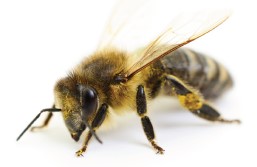
Cecafé, as a legitimate representative of the Brazilian coffee export sector, rationally carries out several sustainable actions with coffee growers and other segments, bearing the national interests in mind.
In its mission to promote the image and communication about Brazilian coffee sustainability, the sector is committed to promoting all actions developed, highlighting the good initiatives of Brazilian agriculture, as well as the best practices of sustainability used in production processes and interactions between agriculture and the environment.
In today’s society, debates on environmental issues and the relationship between the environment and agriculture are becoming more relevant and based on science.
Within this context it is worth highlighting the importance of environmental or ecosystem services. One is the work performed by pollinators, extremely valuable for the ecosystem, and which enables pollen transportation—that is, the transfer of pollen from the male to the female part of the flower, as mentioned earlier in another Cecafé article.
There are several pollinating agents, including birds, bees, butterflies, wasps, and other living beings that visit flowers as a source of food or have access to because they are close to their natural habitat.
Pollination brings countless benefits, playing an important role in food production and agriculture, as well as in scientific development, culture, recreation and in the conservation of the biological diversity.
It is considered essential for plant sexual reproduction and, in its absence, genetic variability cannot be maintained. Often, farming production decreases or fruit is deformed (as a result of insufficient pollination).
In the case of natural systems, insufficient pollination can have quite severe consequences such as the extinction of an herbaceous organism, or poor flora regeneration, among many others.
Approximately 90% of flower species worldwide depend on biotic pollination for reproduction and maintenance of genetic variability.
There are several farming crops that depend on biotic pollination as well, such as coffee, canola, soy, strawberry, tomato, among others.
Pollination is not a must, but in the presence of pollinators one can observe an increase in the productivity and quality of farming crops. According to studies about the interaction of pollinators and agriculture, the pollinated fruit has more seeds, more homogeneity, more uniform format, higher nutritional value and longer shelf life.
Brazilian coffee is recognized as socially, economically and environmentally sustainable. In addition, coffee growing shows that it is possible to have both – good farming production and conservation of biodiversity.
On August 6th this year, there was a live event on the theme, entitled “Women in Sustainable Agribusiness through Bee Pollination”, promoted by the Brazilian Association of Honey Exporters (Abemel), with participation of our Minister of Agriculture, Tereza Cristina.
Minister Tereza Cristina highlighted that pollination is a bio input and that there is room for research and innovation on the subject.
Some honey production initiatives within coffee-growing areas have been observed in the country and followed by close by consumers and producers. There is a potential market to be developed, both on the producers’ side, because of increased productivity and quality, and on the consumers’ side, because of the unique organoleptic characteristics found in honey-related products, including honeys and byproducts.
 The event moderator, Andresa A. Berretta, President of ABEMEL and founder of the startup Agrobee, said that coffee crops that received assisted and intelligent pollination promoted by Startup Agrobee in the 2019/2020 harvest recorded a 20% increase in productivity. There is also room for greater interaction between honey producers and coffee growers, since the former can, for example, temporarily lease their hives to farmers, as it is already the case with apple growers.
The event moderator, Andresa A. Berretta, President of ABEMEL and founder of the startup Agrobee, said that coffee crops that received assisted and intelligent pollination promoted by Startup Agrobee in the 2019/2020 harvest recorded a 20% increase in productivity. There is also room for greater interaction between honey producers and coffee growers, since the former can, for example, temporarily lease their hives to farmers, as it is already the case with apple growers.
Data in the Thematic Report on Pollination, Pollinators and Food Production in Brazil—the result of the partnership between the Brazilian Biodiversity and Ecosystem Services Platform and the Brazilian Plant-Pollinator Network—show that pollinator intervention in coffee crops favored a 30% increase in crop yield, as well as other benefits.
Previous studies have shown that coffee fruit can increase considerably in size with bee pollination. The fruit visited by bees was 1.22 times larger than that without it. It was also observed that honeybees were the main pollinating insects visiting the coffee flowers.
Therefore, the presence of pollinators, such as bees, ensures that there is greater productivity and quality of beans, thus meeting market demand.
Given the scenario, there are still great opportunities ahead and, in order to continue advance at this forefront, it will be essential to increase investments in Research and Development, as well as in strengthening sustainability programs and spreading good practices among producers of all sizes. This will make the national chain even stronger, with increasingly more share of the global market.
Cecafé will continue to follow its mission: staying the course towards an increasingly sustainable and socially responsible future
Studies mentioned:
Amaral, E. (1972). Produção de café na ausência e na presença de insetos polinizadores. Paper presented at the Anais do 2º Congresso Brasileiro de Apicultura, Sete Lagoas, Minas Gerais, Brasil.
De Marco Júnior, P. & Coelho, F. M. (2008). A polinização como um serviço do ecossistema: uma estratégia econômica para a conservação. Universidade de Minas Gerais, Belo Horizonte, Minas Gerais, Brasil.
Klein, A. M., Steffan‐Dewenter, I. & Tscharntke, T. (2003a). Bee pollination and fruit set of arabica and C. Canephora (Rubiaceae). American Journal of Botany, 90(1):153-157.
Marcos Matos – CECAFÉ CEO
Lilian Vendrametto – CECAFÉ Sustainability Manager


Leave A Comment